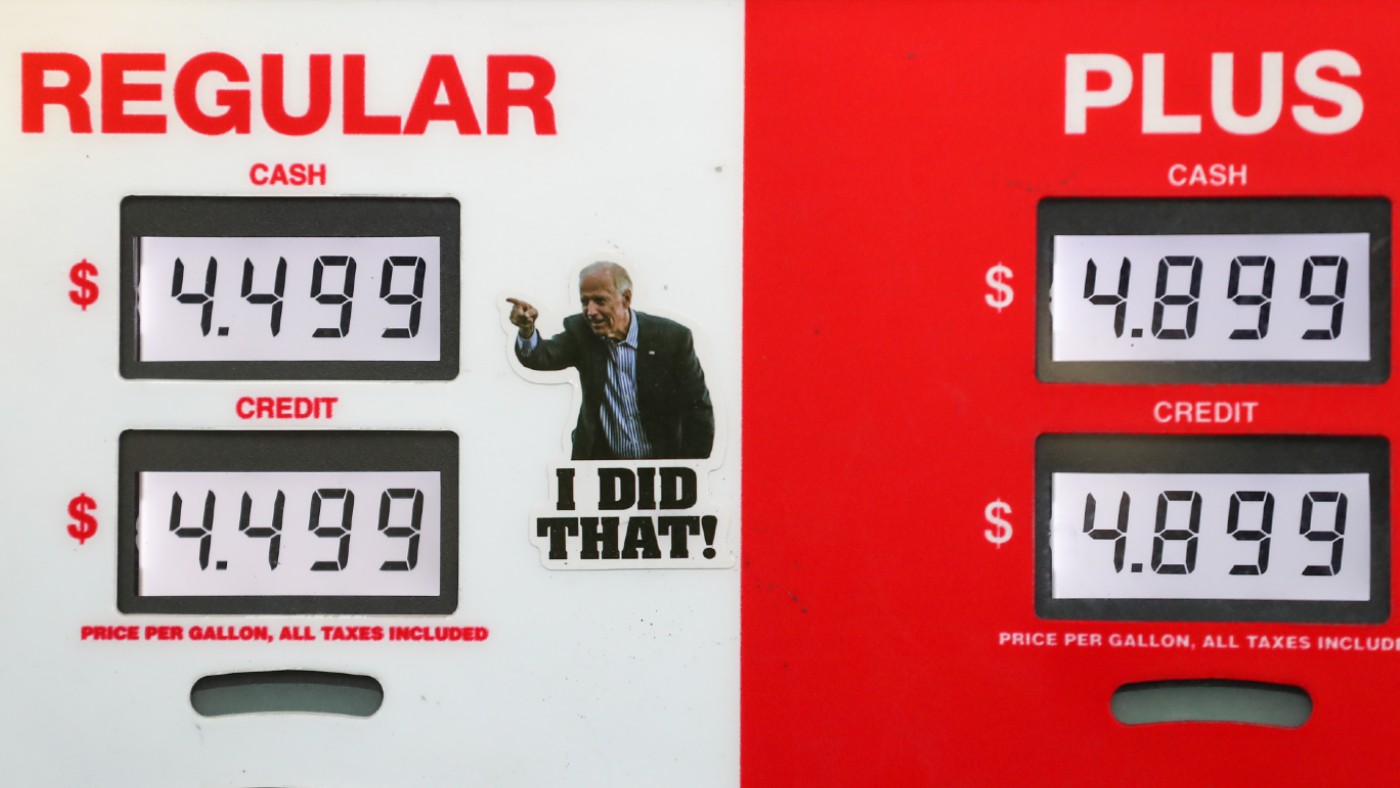Record petrol prices in the US: who should carry the can?
Conservatives are blaming Biden for the high cost of petrol as if there’s some ‘dial in the Oval Office’ that he uses to set prices

A free daily email with the biggest news stories of the day – and the best features from TheWeek.com
You are now subscribed
Your newsletter sign-up was successful
America broke a painful record last week, said Issues & Insights. The average price for a gallon of regular petrol crossed the $4.32 mark, surpassing the prior all-time high set in the summer of 2008. The White House is pretending that the soaring price is down to the Ukraine crisis, but don’t you believe it. It has just as much to do with its own war on America’s fossil-fuel industry. On his first day in the White House, Joe Biden killed off the Keystone XL pipeline that promised to bring in new oil supplies from Canada. Since then, he has blocked other drilling leases and permits. The truth is that the Democratic Party has long wanted petrol to be “priced as a luxury good”. Back in 2008, the man who would become Barack Obama’s energy secretary, Steven Chu, declared, “we have to figure out how to boost the price of gasoline to the levels in Europe”. Well, now their dreams have come true.
Conservatives are rushing to blame the Biden administration for the high cost of petrol, said Hayes Brown on MSNBC.com. People have been putting up little stickers of Biden at petrol pumps showing him pointing at the price total with the caption “I DID THAT!”. But it’s ridiculous to blame him, as if there’s some “dial in the Oval Office that he uses to set gas prices”. The cost of petrol is set by global markets and wider industry trends; it shot up from $80 per barrel to more than $120 following Putin’s invasion of Ukraine. The Keystone pipeline wasn’t even due to come on stream until next year. The industry’s in no hurry to ramp up production: there are 9,000 drilling permits it hasn’t made use of yet.
There is one respect in which Washington politicians really can be blamed for this problem, said Henry Grabar on Slate, and that’s their failure to do more to reduce demand for petrol. The last time America had a sustained run of high petrol prices was between 2011 and 2014. This spurred President Obama to bring in ambitious fuel-efficiency goals for automakers. But under industry pressure, he added a loophole for vehicles with larger footprints. The result: cars got bigger. “By 2018, two in three new vehicles sold was an SUV or a pickup – up from less than one in two a decade earlier.” If only America had taken proper steps a decade ago to get people to drive smaller cars, and make the country more pedestrian- and public-transport-friendly, it wouldn’t be as sensitive to the next “gas price spike”.
The Week
Escape your echo chamber. Get the facts behind the news, plus analysis from multiple perspectives.

Sign up for The Week's Free Newsletters
From our morning news briefing to a weekly Good News Newsletter, get the best of The Week delivered directly to your inbox.
From our morning news briefing to a weekly Good News Newsletter, get the best of The Week delivered directly to your inbox.
A free daily email with the biggest news stories of the day – and the best features from TheWeek.com
-
 Local elections 2026: where are they and who is expected to win?
Local elections 2026: where are they and who is expected to win?The Explainer Labour is braced for heavy losses and U-turn on postponing some council elections hasn’t helped the party’s prospects
-
 6 of the world’s most accessible destinations
6 of the world’s most accessible destinationsThe Week Recommends Experience all of Berlin, Singapore and Sydney
-
 How the FCC’s ‘equal time’ rule works
How the FCC’s ‘equal time’ rule worksIn the Spotlight The law is at the heart of the Colbert-CBS conflict
-
 Currencies: Why Trump wants a weak dollar
Currencies: Why Trump wants a weak dollarFeature The dollar has fallen 12% since Trump took office
-
 Elon Musk’s starry mega-merger
Elon Musk’s starry mega-mergerTalking Point SpaceX founder is promising investors a rocket trip to the future – and a sprawling conglomerate to boot
-
 TikTok: New owners, same risks
TikTok: New owners, same risksFeature What are Larry Ellison’s plans for TikTok US?
-
 Will SpaceX, OpenAI and Anthropic make 2026 the year of mega tech listings?
Will SpaceX, OpenAI and Anthropic make 2026 the year of mega tech listings?In Depth SpaceX float may come as soon as this year, and would be the largest IPO in history
-
 Leadership: A conspicuous silence from CEOs
Leadership: A conspicuous silence from CEOsFeature CEOs were more vocal during Trump’s first term
-
 Ryanair/SpaceX: could Musk really buy the airline?
Ryanair/SpaceX: could Musk really buy the airline?Talking Point Irish budget carrier has become embroiled in unlikely feud with the world’s wealthiest man
-
 Powell: The Fed’s last hope?
Powell: The Fed’s last hope?Feature Federal Reserve Chairman Jerome Powell fights back against President Trump's claims
-
 Taxes: It’s California vs. the billionaires
Taxes: It’s California vs. the billionairesFeature Larry Page and Peter Thiel may take their wealth elsewhere